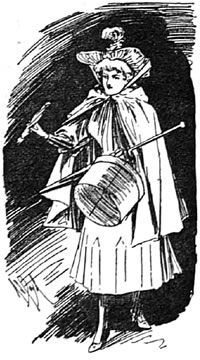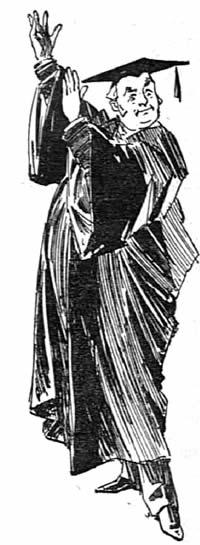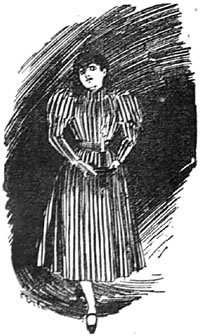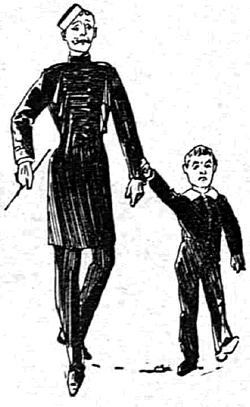 |
 |
||||||
A Selection of Other Reviews
Collected by Scott Farrell
Daily News
...the story upon which Jane Annie is based would not much more than suffice for the plot of a drawing room charade...The antics of the page boy, the manners and language of adults when he assumes, his melodramatic attitude when, being refused a kiss, he exclaims "Summer flies! Now for revenge", and stalks off the stage with folded arms, were a never-failing source of merriment.
Pall Mall Gazette
Jane Annie is a disappointment, and more than a disappointment. It is quite unworthy of the two eminent names that are affixed to it; it baffles comprehension how two men so richly and diversely gifted could have created it... We have a bevy of schoolgirls, with a sham good girl, who is, fitfully, a hypnotist, and a bad girl who has two lovers; we have a pompous proctor who jilted in his youth the elderly schoolmistress; we have an army of new journalists. In the first act the bad girl tries to elope and fails; in the second she tries to elope and succeeds. In the first act, the sham good girl shams goodness to win a good-conduct prize, and in the second act she develops powers of mesmerism by which she makes everybody do as she pleases after a fashion which makes one wonder why she did not employ these miraculous arts earlier and gain the coveted prize without gaining the detestation of her schoolmates. This were perhaps to inquire too curiously, but even a comic opera has a law and logic of its own, and when two masters in other fields of art undertake to write one, they must expect to be taken seriously and not allowed to drift unchallenged from purposeless incident to purposeless incident, not allowed to edge themselves out of a difficulty by the employment of an artifice in the second act which properly makes the first act meaningless.
 |
| Bab (Decima Moore) about to elope. |
It is quite true that Miss Decima Moore has got a colourless, lifeless part, but even a colourless, lifeless part may be quickened into colour, animated into life by a well-chosen, consistently carried out reading. And this Miss Decima Moore failed to do. She looked pretty, moved prettily, sang prettily, but she did not seem to have any clear conception of what the part was like or what might be done with it...It is fitting that a protest should be made against the exceedingly ungraceful fashion in which Mr Rutland Barrington concludes a dance with Miss Decima Moore by seizing his partner up and holding her high in his arms with her head in one direction and her heels in another. This is humour of the Mohock school, most disgraceful clowning...
Mr Ford, in attempting to realise the slender and delicate humour of the comic opera — a humour of which Sullivan, despite all the adverse and laughing criticism he has received, is genuinely a master — has fallen into an error of judgement which involves the destruction of his whole ideal. Perceiving that this sort of humour was a mixture of comicality and sentiment, the has sought for the first in the music hall, for the second in the common ballad of the drawing room. The result can be imagined; and the grievance that makes the matter seemingly far worse is the apparently unconsciousness on his part that he is making any such imitation...Mr Barrie's rare humour, rare tenderness, rare power of character-drawing; Mr Conan Doyle's high spirits, picturesqueness, and unflagging readiness and resource as a story-teller — What had become of all, of any, of these qualities? One good sketch and some humorous annotations do not make a comic opera. As the performance went on on Saturday night, amazement waxed and sorrow deepened with the passing hours...offered as the work of a brace of brilliant authors, it is less of a comic opera than a tragedy.
The Echo
Mr Ford is discreet without much humour. He can parody military music, and his orchestration, without being distinguished or original, is correct and formal; indeed his music may be described as 'polite'. It is a humorous idyll in two parts; it is a series of funny situations without any logical interdependency; it is anything you like — but it is not a play.
Daily Telegraph
The book is a disappointment...the libretto derives no strength from a dramatic story ... the two long acts run their course with a sequence of light and trivial incidents, tolerable as episodes in a strong plot, but, taken by themselves, leaving an impression that nothing in particular is being done, no progress made. This lack of development hangs like a blight over the book ... How could two able men make so great a mistake?
Illustrated London News
There is some sort of story, of course, but we are not quite sure how it begins and we are certainly in considerable doubt about its ending. Hence two sensations — one of incipient boredom, the other of suspicion that matters can only be put completely straight by a third act.
The Topical Times
Among the list of bad 'books', Jane Annie is destined to occupy a conspicuous position. Of plot it has none, and of humour very little. It starts with an anti-climax and ends with a hypnotic frost...[Dorothy Vane] sings with very little grace or expression.
Modern Society
Messrs J.M. Barrie, Conan Doyle and Ernest Ford's opera is distinctly the weakest thing that has been produced... The characters go on and off in an aimless sort of way, and nothing in particular happens from first to last...The features most lacking are freshness and brilliancy. "Let us have something lively," said a voice from the gods after a weak ballad had been encored; and this, I fancy, represented the feeling of the house.
Sporting Times
Jane Annie! What a title! And what an opera! Messrs Barrie and Conan Doyle have thoroughly exemplified how not to do it...They have left the beaten track to which they have been accustomed and have strayed into a jungle, in which they have hopelessly lost their way.
 |
| Rutland Barrington as the Procter |
Daily Graphic
Even in the most preposterous situations Mr Barrington never ceases to be dignified. His dances were blameless, his play of feature immensely droll, and his pseudo-Catherine-wheel might have been safely turned by an archdeacon. The bulldogs were cleverly played by Messrs Lawrence Gridley and Walter Passmore, but they reminded one too much of a pair of music hall grotesques — Mr Passmore, in particular by his get-up, walk and dancing...The popular success of the evening was that of Master Harry Rignold, who made his debut as Caddie...a delightful and entirely original character...with an aplomb and alertness with drew forth the most spontaneous applause...Dorothy Vane is addicted to over-emphasis, and her voice, both in speaking and singing, though clear and effective, lacks variety of tone.
Moonshine
It is a weak, straggling story, badly constructed, and throwing away many a good chance...The entire business is too thin, the motive too slight, the construction too crude, the music too like other music.
St James's Gazette
Mr Rutland Barrington, who was quite at his best on Saturday night, accentuated the success of a very pretty duet for the Proctor and Bab...by seizing the graceful little schoolgirl round the waist, lifting her up into the air and conveying her off bodily to an adjacent arbour. This feast of humour and of athletics raised the enthusiasm of the audience to a high pitch. Mr Barrington was called upon with one voice to repeat this novel and inspiriting practical joke; and a cry, all but unanimous, was afterwards raised for a further repetition. But one dissident — vexed apparently at seeing the charming Bab perpetually in the Proctor's arms — prevailed over the rest of the public. The real success of the evening is Master Rignold. No one will ever forget him who has once seen the piece...He holds with regard to the girls' school (though the comparison would certainly offend him) the sort of position occupied by certain slaves in connection with an Oriental harem...This he does with a humour altogether his own...He is clearly a very clever and capable actor.
Evening News and Post
When Mr Ford is mimicking any particular form of composition he is at his best; when, however, he attempts what must be called by comparison serious music, he fails to produce anything that is novel or worthy ... (The spirit of parody) reaches a climax in the finale of the first act. This is one of the funniest musical jokes that has been heard for a long time. It is an almost note for note travestie of the finale of the first act of Wagner's Lohengrin, and of a kind which will make the long-haired and long-eared devotees to the greatest musician who, in his own estimation, ever lived, rub their noses and pinch their legs in order to assure themselves...Master Rignold sang his songs with a considerable amount of 'go' and with the most approved low-comedy production of voice.
Westminster Gazette
Even in a German Reed drama or pantomime we have rarely seen such a childish device so lavishly employed, and 'when in difficulty, work it out by hypnotising' is a maxim that a very poor hack might invent and even a mediocre playwright might despise.
Saturday Review
[Mr Ford] is best when his treatment of the words is most serious...In his patter songs, Mr Ford is less happy, and does not seem to possess the knack of setting the words without being too strongly influenced by the rhythm of the verse.
 |
| Jane Annie (Dorothy Vane) |
The Citizen
[Dorothy Vane] seems to be too young, and we warn her of a tendency to be too demonstrative... [Decima Moore's] vocal powers are put to a test, and we hope that she may be found strong enough. She is immense, and looks a regular frolicsome English schoolgirl. She sings and dances with vivacity.
The World (review by G.B. Shaw)
Mr Kenningham, whose want of skill as a comedian has not hitherto been any great disadvantage to him, was very decidedly hampered by it this time...A remarkable success was scored by a surpassingly beautiful young gentleman named Scott Fishe, with plenty of musical aptitude and a penetrating but agreeable bass voice, who looked the part of the handsome Lancer to perfection, and was received with shouts of laughter and an encore on the extravagantly silly occasion of his first entry. Mr Scott Fishe must, however, excuse me if, whilst admitting that he is a pleasant and amusing person, I dare not add anything as to his general ability on the strength of his success in the character of a consummate ass.
The Referee
Towards the end it became more and more apparent that the audience were getting rather bored, and the final verdict, though not distinctly unfavourable, was far from enthusiastic.
 |
| Jack (Scott Fishe) and Caddie (Harry Rignold) |
Truth
Mr Fishe is especially an acquisition, for he has a fine stage presence and an excellent baritone voice, and is a capital actor. He was, I believe, almost unknown when Mr D'Oyly Carte discovered him as understudy for Mr Oudin in Ma Mie Rosette.
Morning Post
The presence of this remarkable individual at the end of the first act of Jane Annie would have been of great service to the spectators in helping them to unravel the tangled skein of the story.
Vanity Fair
Had the opera been intended for a brilliant run of one night at Felixstowe, it would have made its fortune...Their principal character would at least have had the advantage of being popular before the curtain went up, and his great solo song — with dance — "I'm an Amateur Impossible Detective", would have been nightly received with thunderous encores.
Our Captious Critic
Jane Annie is a sad mix up. It would require the perspicacity of Sherlock Holmes himself to get at the meaning of it. The two clever gentlemen, its authors, have however been guilty of something more than vagueness; their fun is as trivial as their story is indefinite. There is nothing in the piece from the title onward which takes a grip of the grown-up intelligence...Is it not a mistake to open the opera with so much sleep music? The composer produced an effect on me at first which the authors did not afterwards overcome...Tom has a ballad "It was the time of thistledown", in which, as elsewhere, Mr Kenningham sang nicely, but neither he nor the composer could overcome the ill effect of the "thistledown" — a most unmusical word to begin with, and repeated often enough to surfeit even a Scotchman and — I mean no offence — a donkey.
[Jane Annie was packed up and sent on D'Oyly Carte touring Company "C" after July 1, and it played in Newcastle, Birmingham, Manchester and Bradford before closing on 26 August. — ed.]
Page modified 26 July 2019
